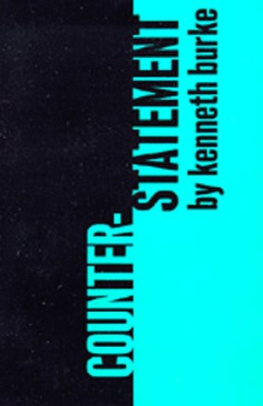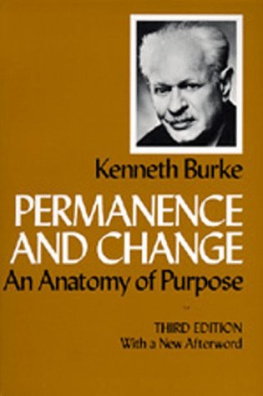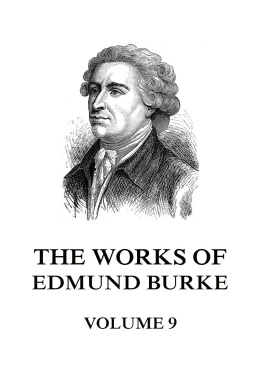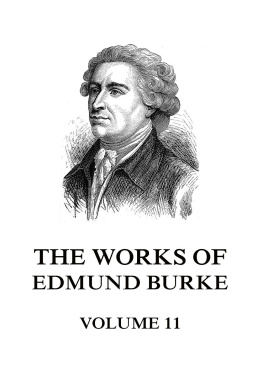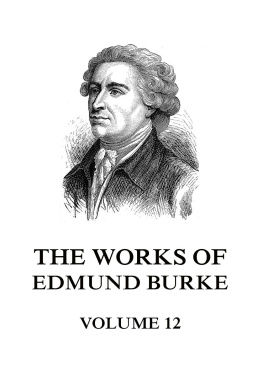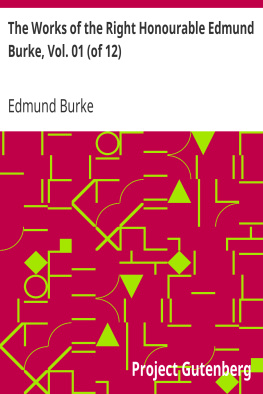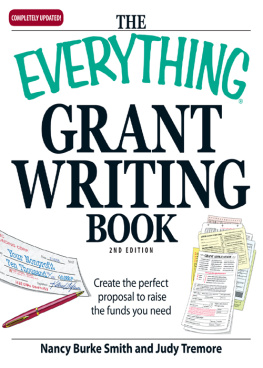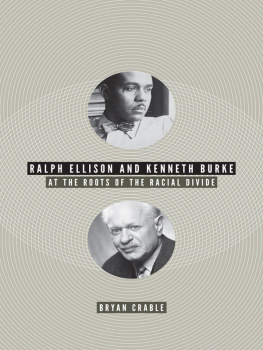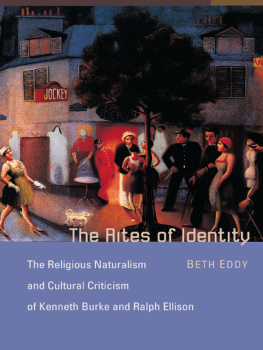Kenneth Burke - Counter-statement
Here you can read online Kenneth Burke - Counter-statement full text of the book (entire story) in english for free. Download pdf and epub, get meaning, cover and reviews about this ebook. year: 1968, publisher: University of California Press, genre: Science. Description of the work, (preface) as well as reviews are available. Best literature library LitArk.com created for fans of good reading and offers a wide selection of genres:
Romance novel
Science fiction
Adventure
Detective
Science
History
Home and family
Prose
Art
Politics
Computer
Non-fiction
Religion
Business
Children
Humor
Choose a favorite category and find really read worthwhile books. Enjoy immersion in the world of imagination, feel the emotions of the characters or learn something new for yourself, make an fascinating discovery.
- Book:Counter-statement
- Author:
- Publisher:University of California Press
- Genre:
- Year:1968
- Rating:5 / 5
- Favourites:Add to favourites
- Your mark:
- 100
- 1
- 2
- 3
- 4
- 5
Counter-statement: summary, description and annotation
We offer to read an annotation, description, summary or preface (depends on what the author of the book "Counter-statement" wrote himself). If you haven't found the necessary information about the book — write in the comments, we will try to find it.
Counter-statement — read online for free the complete book (whole text) full work
Below is the text of the book, divided by pages. System saving the place of the last page read, allows you to conveniently read the book "Counter-statement" online for free, without having to search again every time where you left off. Put a bookmark, and you can go to the page where you finished reading at any time.
Font size:
Interval:
Bookmark:
BY
KENNETH BURKE
HERMES PUBLICATIONS LOS ALTOS, CALIFORNIA
-v-
COPYRIGHT, FIRST EDITION, 1931, BY KENNETH BURKE
COPYRIGHT, SECOND EDITION, 1953, BY KENNETH BURKE
All rights reserved, including the right to reproduce this book or portions thereof in any form.
Composition by Ted Ligda, Palo Alto, California Plates by San Jose Electrotype Printed in the United States of America by Country Life Press
-vi-
PERHAPS it should be said, by way of preface, that this book does not set itself up as an "attack." It deals but secondarily and sporadically with refutation. We have chosen to call it Counter-Statement solely because--as regards its basic concerns and tenets--each principle it advocates is matched by an opposite principle flourishing and triumphant today. Heresies and orthodoxies will always be changing places, but whatever the minority view happens to be at any given time, one must consider it as "counter." Hence the title--which will not, we hope, suggest either an eagerness for the fray or a sense of defeat.
There is pamphleteering; there is inquiry. In so far as an age is bent, a writer establishes equilibrium by leaning (leaning either as his age leans, or in the direction opposite to his age)--and this we might call "pamphleteering." A writer will also desire to develop an equilibrium of his own, regardless of external resistances--and this we might call "inquiry." His actual work will probably show an indeterminate wavering between the two positions; he himself will not be sure just when he is inquiring and when pamphleteering. And he may not be wholly satisfied by the thought of doing exclusively either.
We recall a book on diet which, though it gave stern precepts against over-eating, went on to suggest that one should glut himself on occasion lest he become so inept at managing large quantities of food that he risk insulting his host at a banquet. And perhaps by a similar discrepancy, though cherishing the ideal of inquiry (or sober eating), we
-vii-
should occasionally dip into pamphleteering (or gluttony) in order that so biologic a weapon (for snatching a livelihood from the jungles of society) be not wholly lost through disuse. Once one has pamphleteered, however, dare he not in revision try, even at the risk of canceling himself, to transform the contentious into the speculative? In any event, one must admit that in matters of strength and affirmativeness even the most impulsive literature is a very poor second to brickbats--so it might be better to leave strength and affirmativeness for waylaying a man, and to seek other qualities when writing.
These essays, read in their present order, should serve to elucidate a point of view. This point of view is somewhat apologetic, negativistic, and even antinomian, as regards everything but art. It is not antinomian as regards art because of a feeling that art is naturally antinomian. Art's very accumulation (its discordant voices arising out of many systems) serves to undermine any one rigid scheme of living-and herein lies "wickedness" enough.
Of the writers we discuss, particularly of those we discuss at length ( De Gourmont, Pater, Flaubert, Thomas Mann, Andr Gide) we attempt to emphasize such methods and inclinations as bear upon the issues treated in the more theoretic chapters. Perhaps, in showing what these writers stand for, we do not always show what they are. But when dealing with men whose work is so generally known, one may legitimately be interpretive rather than informative.
The two chapters, "Psychology and Form" and "The Poetic Process," handle somewhat songfully issues which we later discuss in a more clinical fashion.
"The Status of Art" is an attempt to consider various doctrines which have--since the time of Kant--served to bolster Up the "detractors" of art. Several doctrines have come into prominence which seemed to make art questionable--and
-viii-
the essay aims in turn to make these doctrines questionable. It does not propose to set up a rival list of "glorifications."
The "Program" proposes to trace the possible political and economic implications of an attitude which--so far as our primary concerns go--is not political or economic at all. But any scheme of thinking or living must obviously require some specific social structure--and the "Program" seeks to consider, in a general way, what this social structure would have to become if our principles were to prevail: what, in other words, could be the particular practical results of this particular "sthetic."
As for our set-piece, the "Lexicon Rhetoric," it is frankly intended as a machine--machine for criticism, however, not for poetry (which, as someone has said, is always beyond the last formula). It is a kind of judgment machine, designed to serve as an instrument for clarifying critical issues (not so much for settling issues as for making the nature of a controversy more definite). It seeks to perform this function by working out a set of "pivotal" or "key" terms for discussing the processes of literary appeal. It should be a critical nomenclature for paralleling in analytic terms what a work of art itself performs in terms of the "creative," the "imaginative." It is, in general, an attempt to schematize many critical concepts which have been more or less vaguely in the air since psychology took the place of metaphysics as a foundation for aesthetic theory. It also contains a more or less covert attack upon certain critical assumptions of the day, fostered by those who mistake biography for life and usually insist that one write a book as though he were ordering groceries. For the conveying of information about politics, burglaries, trade markets, new comets, and outraged husbands, our newspapers have a very satisfactorily developed technique--and by far the major portion of the world's communications can be adequately couched in this medium. But of the remainder,
-ix-
some fraction may deserve more formal treatment--and gently, deviously, our "Lexicon" pleads for the restoration of stylistic procedures which will avoid not only the vices, but also the virtues, of journalism. And our "Lexicon" would not for the world make literature and life synonymous since, by comparison in such terms, the meanest life is so overwhelmingly superior to the noblest poem that illiteracy becomes almost a moral obligation. Rather, our "Lexicon" would look upon literature as the thing added--the little white houses in a valley that was once a wilderness.
KENNETH BURKE
ANDOVER, NEW JERSEY June, 1931
-x-
LOOKING back over this book, which was originally published twenty years ago, and some parts of which were written more than thirty years ago, I have the "mixed feelings" that usually mark such an experience. There are some youthful, jaunty, even cocksure moments here. But one consideration fills me with unqualified delight. I refer to the fact that the book begins on the word "perhaps" and ends on the word "norm." True, the perhaps-sayer can become in his way as emphatic as yea-sayers and nay-sayers do in theirs (when he dodges among yeas and nays of his own). And the quest of the norm must bring one to feel great sympathy, and even kinship, with many kinds of "abnorm." But the over-all trend is through Perhaps towards the norm (even though I unconsciously revealed my tentativeness with regard to it by ending on it--not outright, but in quotation marks).
Add the theory of form that is developed in these pages (it is summarized in a few lines on page )--and I believe you have, in these three moments, the gist of this book, and maybe also of the books by me that grew out of it.
Font size:
Interval:
Bookmark:
Similar books «Counter-statement»
Look at similar books to Counter-statement. We have selected literature similar in name and meaning in the hope of providing readers with more options to find new, interesting, not yet read works.
Discussion, reviews of the book Counter-statement and just readers' own opinions. Leave your comments, write what you think about the work, its meaning or the main characters. Specify what exactly you liked and what you didn't like, and why you think so.

